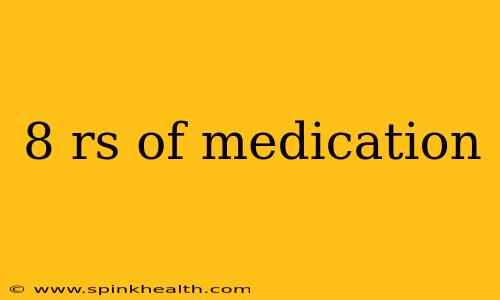The 8 Rs of Medication: Your Guide to Safe and Effective Drug Use
Medication is a powerful tool in managing health conditions, but it's crucial to approach its use responsibly. This isn't just about taking the right pills; it's about understanding the entire process, from initial prescription to safe disposal. Think of it as a journey, and the "8 Rs" are your compass and map, guiding you to safe and effective medication management.
This isn't just for patients; caregivers and healthcare professionals can benefit from understanding these principles as well. Let's delve into each R:
1. Right Medication: This might seem obvious, but double-checking the name and dosage is paramount. Imagine the chaos if you accidentally grabbed the wrong medication! Always verify the label against your prescription before taking anything. If you're unsure, don't hesitate to ask your pharmacist for clarification.
2. Right Dose: Taking the correct dose is critical for efficacy and safety. Too little might not treat your condition effectively, while too much could lead to adverse effects or even toxicity. Carefully read the instructions and follow your doctor's advice precisely.
3. Right Time: Some medications need to be taken at specific times of the day, while others are less sensitive to timing. Your doctor or pharmacist will inform you of the optimal schedule for your medication. Consistency is key, especially for medications that require regular dosing.
4. Right Route: The route of administration refers to how you take the medicine—oral (by mouth), topical (applied to the skin), injection, inhalation, etc. Each medication is designed for a specific route; deviating from this could render it ineffective or even dangerous.
5. Right Patient: This refers to ensuring the medication is given to the correct person. This is especially crucial in healthcare settings, where misidentification can have serious consequences. Always verify the patient's identity before administering any medication.
6. Right Documentation: Keeping accurate records of your medication is vital for your health. This includes the name of the drug, dosage, frequency, administration route, and date. Maintain a medication log—this can be a simple notebook, a spreadsheet, or a dedicated medication management app.
7. Right Reason: Understand why you're taking a particular medication. Knowing the purpose helps you to stay compliant and adhere to the treatment plan. Ask your doctor to explain the medication's function and its role in your overall health management strategy. This is especially critical in long-term treatments where motivation might wane.
8. Right Disposal: Expired or unused medications should never be flushed down the toilet or thrown in the trash. Improper disposal can contaminate water supplies and pose environmental hazards. Check with your local pharmacy or waste management authority for safe disposal options – many pharmacies have take-back programs.
Frequently Asked Questions (FAQs):
What should I do if I miss a dose of my medication?
This depends entirely on the medication and its dosage schedule. Some medications are more forgiving than others. Your doctor or pharmacist will give you specific instructions on how to handle missed doses. Generally, it's best to contact them if you have any questions.
How can I remember to take my medications on time?
Many methods can help you stay on schedule. These include: using a pill organizer, setting reminders on your phone, using medication apps, asking a family member or friend for help, or utilizing a daily planner. Find a system that works best for you and stick to it.
What are the signs of a medication side effect?
Side effects vary greatly depending on the medication. Common symptoms include nausea, headache, dizziness, and stomach upset. However, some side effects can be more serious. Always consult your doctor or pharmacist if you experience any unexpected or concerning symptoms after starting a new medication.
Can I take over-the-counter medications alongside my prescribed medications?
It is essential to consult your doctor or pharmacist before taking any over-the-counter medications alongside your prescribed medications, to avoid harmful drug interactions. Some combinations may be perfectly safe, but others can be dangerous.
By following these 8 Rs, you'll not only enhance the effectiveness of your medication but also significantly reduce the risks associated with its use. Remember, your health is your responsibility. Take ownership of your medication journey!

